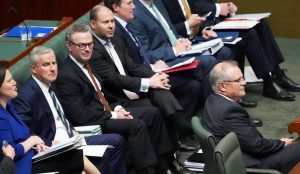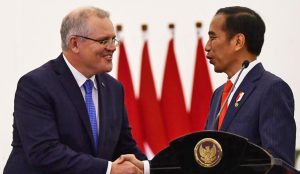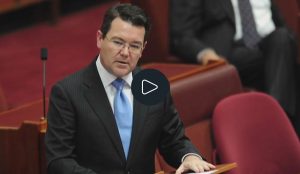
While many Australians are still coming to terms with having five Prime Ministers in as many years, what does the future look like for the world’s sixth oldest continuous democracy?
When it comes to elections in liberal democracies like Australia’s, there are no aberrations and no accidents. The governments we get are the governments that our political system – guided and determined by our votes – delivers legitimately.
But, three changes of our national government and seven changes of Prime Minister in the past 11 years?
Yes, that really happened. And it was fair and square, under the rules.

There have been seven changes of Prime Minister in Australia in the past 11 years. Picture: Getty Images
The same applies in other Western democracies. The installation of Donald Trump in the White House, Britain’s decision to leave the European Union, Emmanuel Macron facing off against the National Rally’s Marine Le Pen for the French presidency – all of these are genuine expressions of the democratic will in these countries.
Those of us waiting for what we might regard as the resumption of normal political transmission are likely to be disappointed.
In an age where economic production and communications are being rapidly transformed – or ‘disrupted’ – it follows that politics is also experiencing serious, irrevocable change.
A Changing Pace
Digital technology has changed the way all of us communicate with each other. Social media has already altered the way the community develops and debates issues. Nationally, our sense of shared attachment and belief in our political system appears to be in decline.
The Australian Election Study, based on interviews with voters on each federal election day, has tracked a steady fall in voter satisfaction with democracy, from 86 per cent in 2007 to 60 per cent at the election two years ago.
Polling by the Lowy Institute on a similar subject has revealed a generation gap when it comes to public attitudes to the system. It found that slightly fewer than half of Australian voters aged under 45 who were surveyed agreed with the proposition that democracy was preferable to any other kind of government.
It’s up to today’s politicians to find ways to help Australians reengage with our political system.
Certainly, there appears to be a leadership deficit in politics.
If not, why have voters and MPs on both sides expended so much energy on switching leaders in recent years? But, there are also many interesting and radical ideas about how to remedy what many perceive as a “broken” system and strong examples of inspiring leadership within our own communities.
It was with this in mind that the McKinnon Prize in Political Leadership was established last year. The prize aims to recognise politicians, at all levels of government, who generate national discussion about our expectations of political leadership, as well as inspire others to pursue courageous and visionary leadership.
It also recognises politicians who have successfully tackled vital issues of public policy, overcome adversity and achieved real change for the public good. Nominations for the 2019 prize, which will be awarded early next year, are open.
The recipients of the inaugural McKinnon Prize were Liberal Senator from Western Australia Dean Smith, who sponsored the Bill that legislated for same-sex marriage, alongside the Mayor of Torres Shire Council Vonda Malone, who was the winner of the emerging leader prize.
Polarised Politics
There’s a need, as always, to see Australia’s political leadership shortcomings in their proper context.
Associate Professor Barbara Keys, from the School of Historical and Philosophical Studies at the University of Melbourne, notes a “transnational feeling that we’re in a post-truth era in which telling the truth is now less important, that truth is more malleable and is something that can be manipulated”.
She attributes this at least in part to the media, which has adopted a more combative mode and the splintering of the old model of mainstream papers and TV being trusted sources of information for the vast bulk of voters.
She sees a paradox at work: “Polarisation in particular is worse than it has been. People are tired of the way that politics is so anger-driven but can’t themselves let go of their anger.”
All the same, Dr Keys doesn’t see the foundations for a Trump-style revolution inside the Australian system.
“It’s a common element to be distrustful of politicians but there’s a level in the States that’s much deeper and more ingrained and more anti-government. Americans since Reagan have been getting the message that government is the problem and that’s not true here to the same extent,” she says.
“I think Australians, relatively speaking, have much more faith in governments’ ability to do good things. The best example we have in recent years is the NDIS. That’s important because Trump won because of this really intense suspicion of government that doesn’t quite exist in the same way here.”
Regional Shifts
Internationally, disruptive forces are also helping to transform economies in the developing world, China being the most obvious example. These changes are especially important for Australia both regionally and strategically.
Professor Tim Lindsey sees a repeat of China’s story happening much closer to home, with the expansion of the Indonesian economy. The big ratings agencies estimate that if Indonesia continues at its current GDP growth rate of five per cent, its economy will be in the top seven globally before 2030.
In the same period, Australia is likely to remain in the bottom half of the G20 economies.
Professor Lindsey, the Director of the Centre for Indonesian Law, Islam and Society at the Melbourne Law School, says Australia is in danger of missing the boat.

Australia’s Prime Minister Scott Morrison with Indonesia’s President Joko Widodo. Picture: Getty Images
“Indonesia has developed a new sort of confidence and assertiveness. They see themselves emerging as a global player and a regional one,” says Professor Lindsey.
“We are not a country that has an enormous impact on Indonesia at all because we have a very poor trade and investment relationship with it. Amazingly, we invest more in New Zealand, Luxembourg, Ireland, Papua New Guinea and almost all other south-east Asian countries than Indonesia.”
Strategically, Indonesia is critically important because it is Australia’s northern shield.
“We’ve pretty much reached a point where Indonesian opinion-makers will quite openly tell you that we seem to need them more than they seem to need us. This has been coming for some time.”
That’s all the more reason for Australia to get its political house in order.
“There is quite a degree of bemusement in Indonesia at our procession of leaders,” Professor Lindsey says.
So, is it the time for new thinking, a reimagining of the ways people interact with the decision-making process?
Deliberative Democracy
Cheryl Saunders, Laureate Professor at the Melbourne Law School, sees a range of problems with Australia’s political parties, which have small memberships and are still regarded essentially as private organisations.
“You can see that with the discussions in relation to the internal Liberal Party fighting, as if it’s all to do with them and not actually something related to Australia’s public interest,” Professor Saunders says.
Parliament needs to become more representative and that may require constitutional change, something she says we have not handled well by running referendum campaigns with “a utopian ‘yes’ case and an end of the world ‘no’ case and that’s it. It’s just childish.”

Parliament needs to become more representative and that may require constitutional change. Picture: Getty Images
Professor Saunders see merit in amending the laws that enable referendums to work in a way that melds representative democracy and direct democracy.
One example is the Irish citizens’ assembly, which has 100 non-politicians tasked with producing reports to parliament on issues including fixed term parliaments, abortion, referendums, the ageing population and climate change.
“One way would be to adapt the citizens’ assembly initiative in Ireland to the different circumstances of Australia and think of ways of having a quite structured, open, national conversation about significant constitutional changes that need to be made in the public interest.”
Opening the closed doors
Mark Triffitt, Lecturer in the School of Social and Political Sciences at the University of Melbourne, is also attracted to the citizens’ assembly model. He believes the organising principles behind policy formulation in Australia have stopped working and there’s little time to waste.
“There is a solution but it involves a political leader in the next three or four electoral cycles recognising that the problem is systemic and making some very brave calls about how the parties and the system engage with citizens,” he says.
“Policy in a democratic system like Australia’s is still a closed system and it’s fought out behind closed doors. People either don’t agree with it or they don’t feel invested in it.
“Deliberative democracy is not the panacea but it’s much more aligned with the way things work in the 21st century.”
Dr Triffitt says the trust deficit in politics is profound among young people.
“The irony is that young people today are probably more politically engaged than before. But the system doesn’t resonate with them because it’s ideological, combative and drawn from a totally different era.”

Young people today are probably more politically engaged than before but the system doesn’t resonate with them. Picture: Getty Images
But, according to Dr Triffit, Australia needs to get its political house in order, sooner rather than later, before current problems become intractable.
“We’ll need some strong, visionary leaders who could well come from outside the system in the next 10 to 15 years; I think that’s the time frame before things become almost irreversible.”

